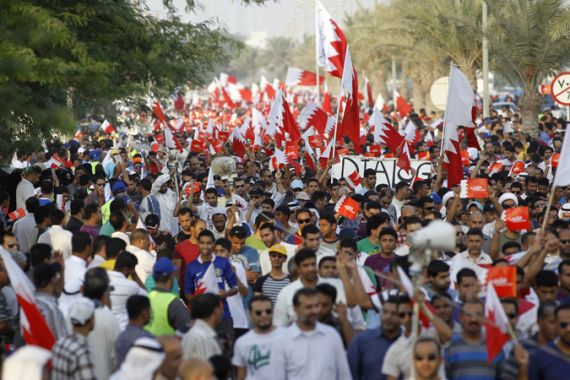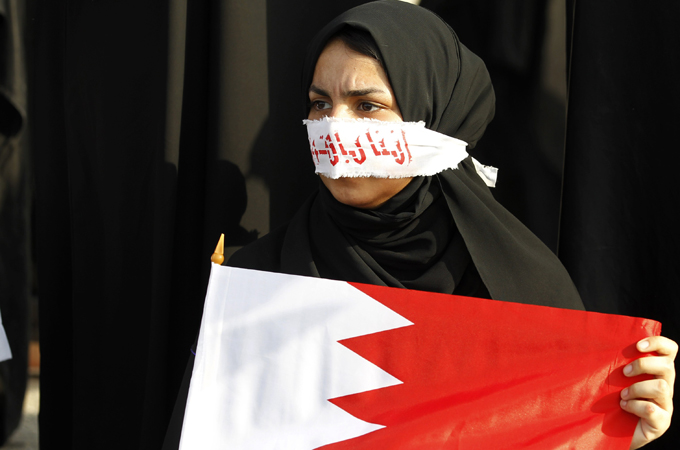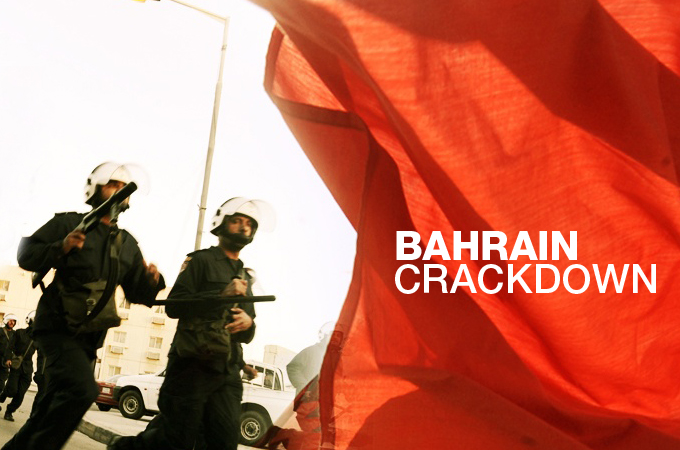Protesters reject Bahrain dialogue results
Demonstrators from Gulf country’s Shia majority say monarchy-sponsored report does not meet expectations.

 |
| Protesters dismissed the results of the national dialogue, with some saying: ”We are Staying” [Reuters] |
Tens of thousands have marched outside Bahrain’s capital Manama, protesting against the results of a national dialogue they say has failed to bring real democratic reform in the Gulf island kingdom.
Shouting “We want freedom” and waving Bahraini flags and banners that read “No to dialogue”, protesters marched along Budaiya highway on Friday as helicopters from the security forces buzzed overhead.
Some began to shout “Down, down, Hamad” in the Friday march, which organisers entitled “The people are the source of authority”.
King Hamad bin Isa al-Khalifa on Thursday approved parliamentary reforms submitted by a state-appointed body dialogue commission.
The process “reflects the determination [of the participants] to rise above the latest incidents,” King Hamad said in a televised speech on Thursday.
“We have ordered the executive and legislative authorities to take the necessary measures to approve the agreements,” he said after receiving a report by the state-appointed National Dialogue, set up to address grievances after the government crackdown.
The changes grant more powers of scrutiny to the elected lower house of parliament but preserve the dominance of the upper house appointed by the royal elite.
Bahrain’s Sunni rulers launched the formal dialogue in July, aiming to quell international criticism of its crushing of mass pro-democracy protests led by the Shia majority in February and March.
Widespread disapproval
Opposition groups and many in the Shia population argued their voice in the dialogue was overshadowed by a majority of pro-government participants. The government said it had selected representation that accurately reflected society.
Wefaq, the largest Shia opposition group, walked out of the dialogue several weeks ago and now members said they felt their actions were justified after the body’s results were announced.
“The government thought the results were great. We thought they were nothing,” Sayed al-Mousawi, a Wefaq leader, said. “There’s no fully elected government, no reforms to the voting system. It’s a one-sided deal.”
Shia Bahrainis have long complained of discrimination in jobs and services and accuse the government of gerrymandering electoral districts, charges the government denies.
Khalil al-Marzouq, a Wefaq spokesman, said the final proposals vindicated his group’s decision to boycott.
“The reason we pulled out is because of this. The upper house should only be there for consultation,” he said.
The lower house of parliament currently holds limited authority since all the country’s decisions, including the appointment of government ministers, ultimately rest with the king.
Other proposed reforms are aimed at addressing “the need for fairer electoral constituencies”, though the recommendations stopped short of specifically calling for the realigning of electoral districts that members of the opposition say are unfairly drawn.
 |
| Click for more of Al Jazeera’s coverage on Bahrain |
According to the new proposal, the prime minister, appointed by the king, would have to secure the approval of parliament for members of his government.
“If MPs disapprove they can vote to reject the entire government. Parliament will also have the power to reject the government’s four-year work plan,” it said.
“These reforms guarantee that the government’s composition and work plan will reflect the will of the people.”
It also said cabinet ministers would have to attend some parliament sessions and face questioning in the open chamber rather than within the framework of committees.
Sheikh Khalifa bin Salman, the prime minister of 40 years, is regarded as a leading figure within the ruling family, who opposes concessions to the opposition.
Bahrain’s Sunni Muslim rulers called in troops from Saudi Arabia and other Gulf states in March to help quell protests dominated by the majority Shia community.
The government said the unrest was sectarian and backed by non-Arab Shia power Iran, which the Bahraini Shias have denied.
Bahrain, home port to the US Fifth Fleet, lies on a tense faultline between Shia Iran, just across the Gulf, and Sunni-ruled Saudi Arabia, which is connected to the tiny Gulf Arab state by a causeway.
Hundreds were arrested during Bahrain’s crackdown on the large protests in March, and dozens have yet to be released.
Protesters on Friday had hoped to stage a protest outside the US embassy in Manama ahead of their evening march.
But riot police set up several checkpoints to block entrance to the area.